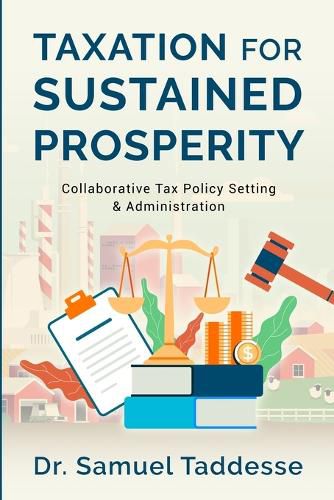Readings Newsletter
Become a Readings Member to make your shopping experience even easier.
Sign in or sign up for free!
You’re not far away from qualifying for FREE standard shipping within Australia
You’ve qualified for FREE standard shipping within Australia
The cart is loading…






This title is printed to order. This book may have been self-published. If so, we cannot guarantee the quality of the content. In the main most books will have gone through the editing process however some may not. We therefore suggest that you be aware of this before ordering this book. If in doubt check either the author or publisher’s details as we are unable to accept any returns unless they are faulty. Please contact us if you have any questions.
The primary business of government is to develop, implement, and strengthen the conditions that enhance the quality of life of all citizens. Taxation is required to fund government operations to produce and deliver the essential public goods and services that enhance and strengthen citizens’ quality of life and standard of living. Countries like Ethiopia that are not endowed with natural resources such as oil, minerals, and precious metals rely heavily on tax revenues collected from citizens, residents, and businesses.
To effectively achieve this goal, government policymakers must understand:
What matters for quality of life? What must be done to enhance citizens’ quality of life? How would the government fund the programs designed to improve citizens’ living standards over the next ten years? And How must the government collaborate with citizens, businesses, residents, and development partners to implement and manage programs that tangibly improve citizens’ quality of life?
Citizens’ quality of life and living standards are inextricably linked to the quantity, quality, and access to education, healthcare services, clean water, sanitation, agriculture and nutritious food supplies, peace, justice and security, transport, and communication infrastructures, including roads, bridges, telecommunications, and internet connectivity, among others. Quality of life and citizens’ living standards are also conditional on citizens’ income-generating abilities, productivity, and overall national income equality. Developing and strengthening the conditions that enhance citizens’ standard of living require massive amounts of investments. A primary source of funds is tax revenue collected from citizens, businesses, and residents. Taxes are imposed by law. This book links taxation with citizens’ prosperity and well-being. It identifies how a tax policy should be formulated and how effectively, equitably, and efficiently taxes should be collected.
$9.00 standard shipping within Australia
FREE standard shipping within Australia for orders over $100.00
Express & International shipping calculated at checkout
This title is printed to order. This book may have been self-published. If so, we cannot guarantee the quality of the content. In the main most books will have gone through the editing process however some may not. We therefore suggest that you be aware of this before ordering this book. If in doubt check either the author or publisher’s details as we are unable to accept any returns unless they are faulty. Please contact us if you have any questions.
The primary business of government is to develop, implement, and strengthen the conditions that enhance the quality of life of all citizens. Taxation is required to fund government operations to produce and deliver the essential public goods and services that enhance and strengthen citizens’ quality of life and standard of living. Countries like Ethiopia that are not endowed with natural resources such as oil, minerals, and precious metals rely heavily on tax revenues collected from citizens, residents, and businesses.
To effectively achieve this goal, government policymakers must understand:
What matters for quality of life? What must be done to enhance citizens’ quality of life? How would the government fund the programs designed to improve citizens’ living standards over the next ten years? And How must the government collaborate with citizens, businesses, residents, and development partners to implement and manage programs that tangibly improve citizens’ quality of life?
Citizens’ quality of life and living standards are inextricably linked to the quantity, quality, and access to education, healthcare services, clean water, sanitation, agriculture and nutritious food supplies, peace, justice and security, transport, and communication infrastructures, including roads, bridges, telecommunications, and internet connectivity, among others. Quality of life and citizens’ living standards are also conditional on citizens’ income-generating abilities, productivity, and overall national income equality. Developing and strengthening the conditions that enhance citizens’ standard of living require massive amounts of investments. A primary source of funds is tax revenue collected from citizens, businesses, and residents. Taxes are imposed by law. This book links taxation with citizens’ prosperity and well-being. It identifies how a tax policy should be formulated and how effectively, equitably, and efficiently taxes should be collected.